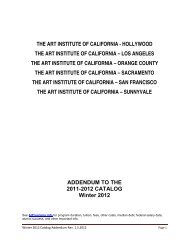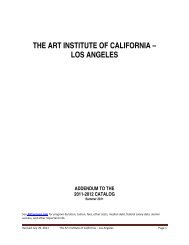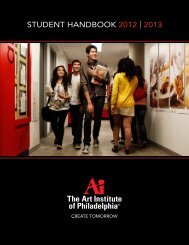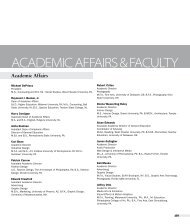2009 - 2010 Catalog - The Art Institutes
2009 - 2010 Catalog - The Art Institutes
2009 - 2010 Catalog - The Art Institutes
You also want an ePaper? Increase the reach of your titles
YUMPU automatically turns print PDFs into web optimized ePapers that Google loves.
CGPA; however, they do count in<br />
determining the maximum time frame<br />
and the incremental completion rate.<br />
Transitional studies courses may be<br />
individually attempted no more than<br />
three times. Failing or withdrawing<br />
from a transitional studies course three<br />
times will result in dismissal.<br />
9. If a student appeals and is denied the<br />
appeal, he or she must remain out of<br />
school until one year after the quarter<br />
in which the appeal was denied. <strong>The</strong><br />
student can then request an additional<br />
appeal for reinstatement, but would<br />
have to demonstrate accomplishments<br />
or changes that show a degree of<br />
college readiness that reliably predict<br />
success. Should the student have<br />
his or her appeal denied a second<br />
time, the student will be permanently<br />
dismissed from the Institute. If the<br />
student’s appeal is granted, he or she<br />
will be placed on probation at the start<br />
of the term, and would be required to<br />
attain CGPA and ICR milestones by<br />
the next evaluation point. Failure to do<br />
so will result in a permanent dismissal.<br />
* A student will be notified in writing<br />
as to the decision to grant or<br />
deny his or her appeal.<br />
OTHER STANDARDS OF ACADEMIC<br />
PROGRESS:<br />
1. Following is a list of possible events<br />
that may be considered as mitigating<br />
circumstances that could negatively<br />
impact academic progress:<br />
• Death of an immediate family member<br />
• Student illness requiring<br />
hospitalization (this includes mental<br />
health issues)<br />
• Illness of an immediate family<br />
member where the student is a<br />
primary caretaker<br />
• Illness of an immediate family<br />
member where the family member is<br />
the primary financial support<br />
• Abusive relationships<br />
• Divorce proceedings<br />
• Previously undocumented disability<br />
• Natural disaster<br />
• Family emergency<br />
• Financial hardship such as<br />
foreclosure or eviction<br />
• Documentation from the College<br />
Counselor and/or a Professional<br />
Counselor.<br />
• Documentation of mitigating<br />
circumstances from a school or<br />
professional counselor should<br />
not breach the student/counselor<br />
relationship. A memorandum or letter<br />
on school or organizational letterhead<br />
indicating a counselor’s opinion<br />
that student issues are contrary<br />
to satisfactory academic progress<br />
will suffice as proof of mitigating<br />
circumstances.<br />
<strong>The</strong> Dean of Academic Affairs is responsible<br />
for determining the impact of the<br />
mitigating circumstance as regards to the<br />
severity, timeliness, and the student’s ability<br />
to avoid the circumstance. Student life<br />
issues and making the transition to college<br />
are not considered mitigating circumstances<br />
under this policy since students have at<br />
least two quarters in a diploma and three<br />
quarters in a degree program to adjust to<br />
college life.<br />
2. Grades achieved in repeated classes<br />
will replace grades of ‘F’, ‘W’, or<br />
‘WF’. Grades of ‘F’, ’W’, or ‘WF’ are<br />
included in the maximum allowable<br />
time frame and incremental completion<br />
rate requirements. Students may also<br />
retake classes in which they received a<br />
passing grade in order to improve their<br />
CGPA. However, a student cannot<br />
receive financial aid for repeating<br />
courses in which a passing grade has<br />
already been earned.<br />
3. Transfer credits from other postsecondary<br />
institutions are not<br />
calculated in the maximum allowable<br />
credits or incremental completion<br />
rate requirements; however, transfer<br />
credits do reduce the total number of<br />
credits that must be attempted within<br />
the program. <strong>The</strong>refore, the maximum<br />
number of attempted credits for a<br />
student with transfer credit is one and<br />
one-half times the number of credits<br />
required to complete for graduation.<br />
Example: if a student transfers 36<br />
credits to a program consisting of 180<br />
credits, the calculation would be 180 –<br />
36 = 144 X 1.5 = 216 credits.<br />
Grades for credits transferred from any<br />
post-secondary institution (including<br />
an <strong>Art</strong> Institute) will be recorded<br />
as “TR” in the Student Information<br />
System and will not affect the<br />
student’s CGPA.<br />
Students wishing to transfer from<br />
one <strong>Art</strong> Institute to another may do<br />
so only if they are in good standing<br />
at the sending school. Any student<br />
dismissed for academic progress<br />
cannot transfer to another <strong>Art</strong> Institute<br />
until he or she has been reinstated<br />
at the sending school and is deemed<br />
to be making satisfactory academic<br />
progress.<br />
4. Students will be allowed only one<br />
change of program. On rare occasions<br />
and with good reason, the Dean of<br />
Academic Affairs may allow a student<br />
an additional change of program.<br />
Changing from day to evening in the<br />
same program is not considered a<br />
change of program. Changing from a<br />
diploma level to a degree level or an<br />
associate’s level to a bachelor’s level in<br />
the same program is not considered a<br />
change of program.<br />
Courses taken in one program<br />
applicable to the second program<br />
shall be transferred with the grade. If<br />
students have taken a course more<br />
than once, all grades pertinent to<br />
that course shall apply to the second<br />
program. Grades earned in the<br />
original program shall count towards<br />
the cumulative grade point average.<br />
However, in cases in which a student<br />
has graduated from the college in<br />
one program then subsequently<br />
begins work in a different program,<br />
grades used in the CGPA of the<br />
previous program will not be applied<br />
to the student’s new program CGPA<br />
calculation. <strong>The</strong> grades will be<br />
recorded as TR.<br />
For ICR purposes only, those courses<br />
transferred will apply to the new<br />
program. <strong>The</strong> maximum allowable<br />
timeframe shall be calculated as the<br />
total number of credits in the program<br />
minus the number of credits applied<br />
to the new program X 1.5. Example:<br />
if a student transfers 36 credits to a<br />
program consisting of 180 credits, the<br />
calculation would be 180 – 36 = 144 X<br />
1.5 = 216 credits. Second example:<br />
if a student earned 36 credits in the<br />
original program that are applicable<br />
to the new program, but transfers 48<br />
credits due to repeating failed classes,<br />
the maximum allowable timeframe is<br />
reduced to 198 credits.<br />
5. In order for students to graduate, the<br />
minimum requirements are a CGPA of<br />
2.0, ICR of 66.67% and completion of<br />
the program in no more than 150% of<br />
total program credits.<br />
87
















